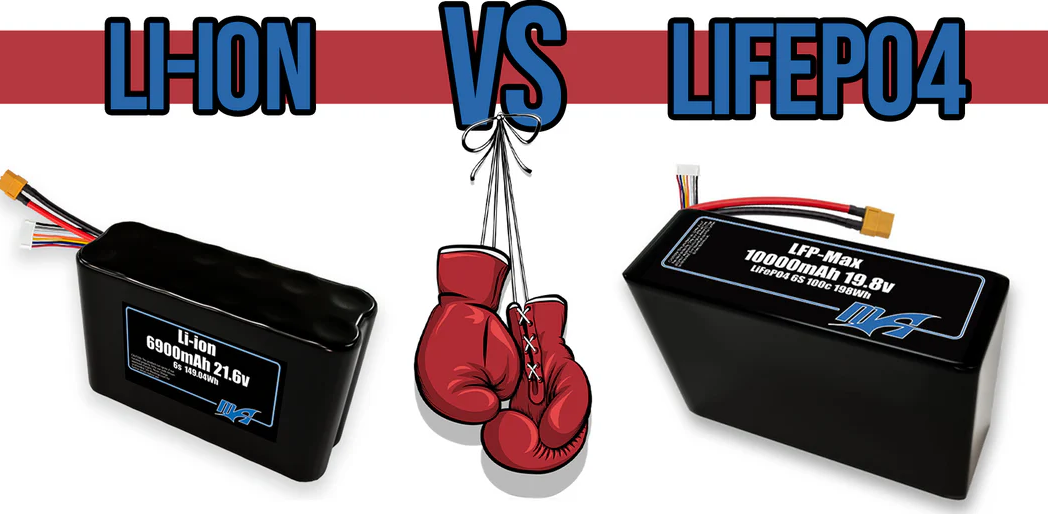LiFePO4 vs. Li-ion Batteries: Understanding the Differences and Which One is Better Leave a comment
LiFePO4 vs. Li-ion Batteries: Understanding the Differences and Which One is Better
In the world of energy storage and portable power solutions, lithium-based batteries are at the forefront of technological innovation. Two popular types of lithium batteries are LiFePO4 (Lithium Iron Phosphate) and Li-ion (Lithium-ion). While they may seem similar at first glance, they differ significantly in their construction, performance, and applications. In this blog, we’ll explore the key differences between these two battery types and determine which one is the better option for various uses.
What is LiFePO4 Battery?
LiFePO4, or Lithium Iron Phosphate, is a type of lithium battery that uses iron phosphate as the cathode material. It is known for its stability, safety, and long life cycle, making it a popular choice in applications where durability and reliability are crucial, such as in solar energy systems, electric vehicles, and backup power solutions.
What is Li-ion Battery?
Li-ion, or Lithium-ion, is a family of rechargeable batteries that use a variety of materials for the cathode, such as cobalt, nickel, and manganese. These batteries are widely used in consumer electronics, electric vehicles, and energy storage systems. Li-ion batteries are known for their high energy density, lighter weight, and higher voltage compared to other battery types.
Key Differences Between LiFePO4 and Li-ion Batteries
- Chemistry and Materials
The most significant difference between LiFePO4 and Li-ion batteries lies in their chemistry. LiFePO4 uses iron phosphate for its cathode material, while Li-ion batteries typically use materials like lithium cobalt oxide or lithium nickel manganese cobalt oxide. This difference in chemistry gives each battery distinct properties in terms of energy density, lifespan, safety, and cost. - Energy Density
Li-ion batteries generally have a higher energy density than LiFePO4 batteries. This means Li-ion batteries can store more energy in a smaller and lighter package. As a result, Li-ion batteries are commonly used in applications that require high power output in a compact form, such as smartphones, laptops, and electric cars. - Safety
One of the key advantages of LiFePO4 batteries is their superior safety. LiFePO4 batteries are more thermally stable, reducing the risk of overheating, fire, or explosion. This makes them a safer option for applications where reliability and long-term safety are a priority, such as in renewable energy systems and large-scale storage solutions. On the other hand, Li-ion batteries, if not properly managed, can experience thermal runaway, leading to safety concerns. - Cycle Life
LiFePO4 batteries tend to have a much longer cycle life compared to Li-ion batteries. A typical LiFePO4 battery can last between 2,000 and 5,000 charge cycles, while Li-ion batteries generally last between 500 and 1,500 charge cycles. This makes LiFePO4 a better choice for long-term applications where battery replacement costs need to be minimized. - Cost
LiFePO4 batteries are generally more affordable than Li-ion batteries. While the initial cost of Li-ion batteries may be lower, their shorter lifespan and higher replacement costs over time can make them more expensive in the long run. LiFePO4 offers a more economical solution for systems that require frequent charging and long service life. - Environmental Impact
Both LiFePO4 and Li-ion batteries have a relatively low environmental impact compared to traditional lead-acid or alkaline batteries. However, the materials used in LiFePO4, such as iron and phosphate, are more abundant and less toxic than the materials found in some Li-ion batteries, like cobalt. This makes LiFePO4 batteries a more environmentally friendly option overall.
Which Battery is Better for You?
The decision between LiFePO4 and Li-ion batteries depends on your specific needs and application:
- Choose LiFePO4 if:
- You prioritize safety and long lifespan.
- You are using the battery for solar energy storage or electric vehicles that require frequent cycling.
- You are looking for a more affordable and eco-friendly battery solution in the long term.
- Choose Li-ion if:
- You need a high energy density for compact devices like smartphones, laptops, or electric vehicles where size and weight are important.
- You require a higher voltage or faster charging capabilities for more demanding applications.
- You are willing to trade off a shorter lifespan for lighter weight and higher performance in certain applications.
Conclusion
Both LiFePO4 and Li-ion batteries have their unique advantages, and the choice between the two depends on the application. If safety, long-term cost-effectiveness, and durability are your primary concerns, LiFePO4 is the better choice. However, if energy density and lightweight are crucial for your device or application, Li-ion batteries may be the better fit. Regardless of your decision, both battery types represent a leap forward in energy storage technology, offering improved performance and reliability over traditional battery solutions.

